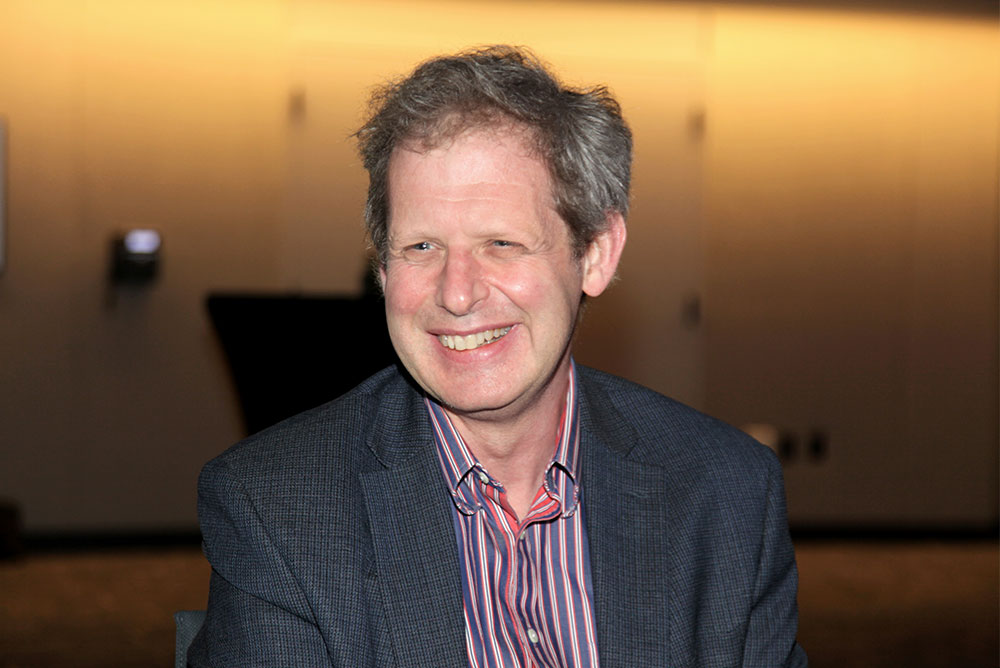
Image by Aaron Salcido.
Eugene Volokh is a Ukrainian American legal scholar known for his scholarship in American constitutional law and libertarianism as well as his prominent legal blog “The Volokh Conspiracy.” He is the Gary T. Schwartz Professor of Law at UCLA, and is an academic affiliate at the law firm Mayer Brown. Before speaking at a Zócalo/ASU Cronkite School event, “Does the First Amendment Still Protect Free Speech?” Volokh spoke to us in the green room about Rudyard Kipling, his family’s New Year’s tree, and why he’d be Ravi from iZombie.
What’s the last board game you played?
Settlers of Catan. It has two functions for me: one is when I work out on my elliptical, I need something mindless to take me away from the boredom of being on the elliptical. And the other function is that it’s one of the few games that I can actually get my wife and at least one of my kids to play. Chess I can play with just one.
Would you say you’re a big chess fan?
I’m a Russian Jew—a Russian Jewish male, especially. It’s kind of required. My family taught me, the way that Russian Jewish men are taught—by their fathers, passing it down. I remember I learned it in Russia before I came here.
Any traditions that your family brought with you from the Soviet Union to the U.S.?
It’s funny, we always had a Christmas tree, although for me, it’s always been a New Year’s tree. The American Jews were kind of shocked and somewhat put off by my mother, who’s very aesthetically minded, insisting on having a tree. Because to them, first of all, it’s Christian. Not at all Russian, which is atheist. In the Soviet Union, it was the New Year’s tree. It was just a beautiful, lovely smelling thing, one of the few kinds of really nice things you can have in Russian life.
Do you have a favorite poem?
One of my favorite ones is called “The Sons of Martha” by Rudyard Kipling. And one thing that I like about it is that most poems are about love or death or about the meaning of life. This one is about civil engineering. And this is from a time when I think people cared and valued engineering. First of all, I think Kipling was just a great master of the English language. Second, there’s very little that’s elevated in the wording. It wasn’t poetic language; it was ordinary language. Kipling talks about something really very important, but also something that most poets don’t pay any attention to. Because what do they care about engineers? If they wanted to be engineers, they wouldn’t be poets.
Do you have a favorite piece of legalese?
Legalese is usually pejorative. But there are great lines from judges. One, which I used in class today, was from Oliver Wendell Holmes: “detached reflection is not to be expected in the presence of an upraised knife.” That was from a self-defense case. And his point is that when people’s lives are being threatened, you can’t expect them to be so thoughtful and careful. I think the best kind of legalese, or legal writing, is that that it expresses clearly and succinctly a reality of life. That law is about life; law is about figuring out what rules make sense in light of human nature, as opposed to in light of some abstract logic. There’s another line that’s very much apropos to today’s conversation: I founded the Journal of Free Speech Law, and our motto is from a Holmes’ opinion. He was talking about the First Amendment, and said it is an experiment, as all life is an experiment.
What’s your best guilty pleasure?
TV shows that aren’t great dramas, but they’re just going to be so much fun. One of my favorite ones, which I haven’t watched for several years because it’s gone now, is iZombie. Nobody’s going to confuse it with great literature or great science fiction or fantasy. The whole framing is that she eats people’s brains and gets their memories and solves crimes. It’s just so nicely executed. And my favorite character, of course, Ravi. I would like to think if I were dropped into that universe, I would be Ravi.
You seem to take so much pleasure out of life. Where does that joie de vivre come from?
There’s so much in this world to enjoy. There are bad things too but it’s inevitable, right? Any world where you can eat whatever food you want to eat, listen to whatever music you want to listen to, watch any movies out there. Read all these books. Talk to all of these people from all over about everything. You’ve got to be able to find something to enjoy there. Otherwise, it’s just lack of imagination.



